The Sabbath is traditionally observed on Saturday in Judaism, with practices starting from Friday evening. This day is dedicated to rest and spiritual reflection, as outlined in biblical texts like Genesis and Exodus. In Christianity, however, the Sabbath primarily shifts to Sunday, known as the "Lord's Day," which began with Emperor Constantine in A.D. 321. Some groups, like Seventh-day Adventists, still uphold Saturday as their Sabbath. Understanding these traditions can give you deeper insight into their significance. If you want to know more about its observance and importance, there's plenty more to explore.
Key Takeaways
- The Sabbath is traditionally observed on Saturday in Judaism, starting from Friday evening to Saturday evening.
- Christians primarily observe the Sabbath on Sunday, known as the "Lord's Day."
- Seventh-day Adventists continue to observe the Sabbath on Saturday.
- The term "Sabbath" derives from the Hebrew word "Shabbat," meaning rest.
- Observance of the Sabbath varies across different denominations and individual beliefs.
Introduction

The Sabbath holds significant importance in many religious traditions, particularly in Judaism and Christianity. Traditionally, the Sabbath is observed on the seventh day of the week, which is Saturday. This begins at sunset on Friday and ends at sunset on Saturday, allowing for a dedicated time to worship God and rest.
The term "Sabbath" comes from the Hebrew word "Shabbat," which means rest, reflecting the biblical account of God resting on the seventh day of creation.
In the New Testament, references confirm the significance of this day. For instance, in Luke 23:53-56, you see that Jesus' burial occurred on Preparation Day (Friday), and the women rested on the Sabbath (Saturday) following His death. This highlights the continuity of Sabbath observance.
It's interesting to note that over 100 languages translate the seventh day as "Sabbath," reinforcing its identification with Saturday.
Historically, the shift from Saturday to Sunday as a day of worship for Christians was influenced by changes initiated by Emperor Constantine in A.D. 321. Understanding these aspects helps clarify why the Sabbath remains a vital observance for many believers today.
Biblical Sabbath Observance Guidelines

When you explore biblical Sabbath observance guidelines, you'll find key references that outline what this day means.
Primary and secondary Bible texts provide a framework for understanding the significance of rest and worship.
Let's look at these scriptures to grasp the essence of Sabbath observance.
Primary Bible References
Seven key Bible passages outline the guidelines for observing the Sabbath, emphasizing its importance as a day of rest and worship. The Sabbath is established in Genesis 2:2-3, where God rests on the seventh day, setting a precedent for you to follow.
Exodus 20:8-11 reinforces this, instructing you to remember the Sabbath and keep it holy. In Exodus 31:16-17, the Sabbath serves as a sign between God and Israel, highlighting the necessity of resting on this day.
The New Testament supports the Sabbath's timing, as illustrated in Luke 23:53-56, where Jesus' burial occurs before the Sabbath, and the women rest according to the commandment. This reflects the continuity of observing the seventh day as a sacred time for rest.
Additionally, historical references note that early Christians primarily observed Saturday as the Sabbath before the shift to Sunday worship.
The term "Sabbath" comes from the Hebrew "Shabbat," meaning "rest," and this concept is echoed in various languages worldwide.
Secondary Bible References
In exploring biblical Sabbath observance guidelines, you'll find numerous secondary references that further clarify its significance and practices. For instance, the Fourth Commandment instructs you to remember the Sabbath day and keep it holy, emphasizing rest as a divine principle established by God after creation (Exodus 20:8-11). This foundational truth is echoed in Genesis 2:2-3, where God rests on the seventh day, marking it as a day holy.
Throughout the New Testament, you can see that the early church primarily observed the Sabbath on Saturday, aligning with the Jewish tradition. Jesus' burial on Preparation Day (Friday) and the subsequent resting of the women on the Sabbath (Luke 23:53-56) affirm that Saturday is the biblical Sabbath.
While the Christian Sabbath shifted to Sunday over time, influenced by cultural changes, the importance of Sabbath observance remains vital.
As you reflect on these secondary references, consider how they shape your understanding of the first Sabbath and its implications today. Observing the Sabbath isn't just a command; it's an opportunity for rest, reflection, and spiritual renewal.
Ancient Agrarian Society Practices
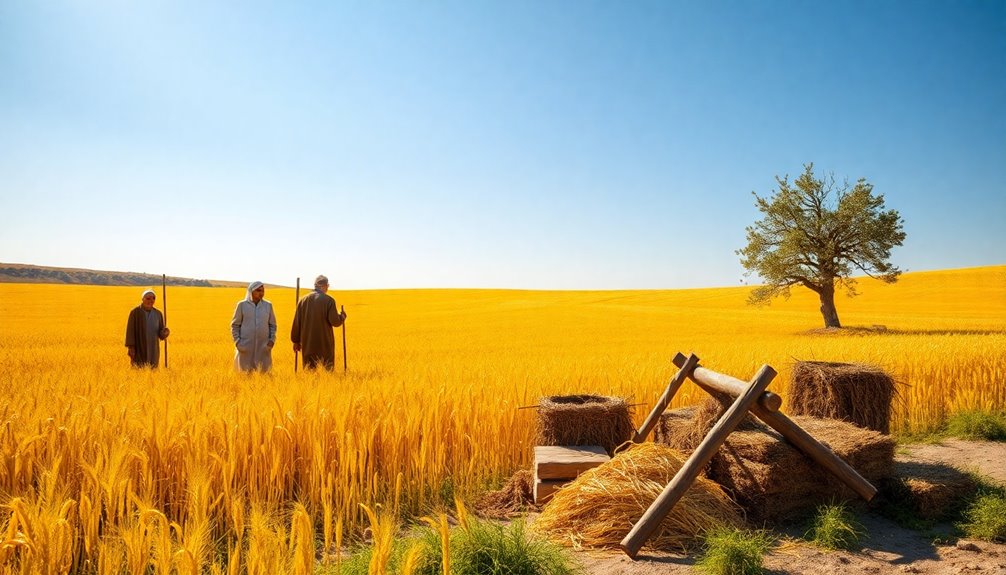
Sabbath observance in ancient agrarian societies played a vital role in the rhythms of community life. You'd find that the Sabbath was a designated day of rest, allowing farmers and laborers to step back from their agricultural tasks and recharge both physically and spiritually. This practice echoed the biblical command to observe a day of rest, creating a sanctuary in their busy lives.
The agricultural calendar significantly influenced when communities observed the Sabbath. Harvest cycles often determined when rest and worship were prioritized, fostering a sense of unity during peak seasons.
On the Sabbath, many engaged in communal activities, such as feasts and religious gatherings, which reinforced social bonds and upheld cultural traditions. Rituals observed during the Sabbath emphasized gratitude for the harvest and the connection between spiritual reflection and agricultural life.
Strict restrictions were placed on work, ensuring that activities like plowing and sowing were prohibited, which preserved the sanctity of the day. This collective observance not only provided a break from labor but also strengthened the community by fostering shared values and practices that defined their way of life.
Sabbath's Significance in Judaism
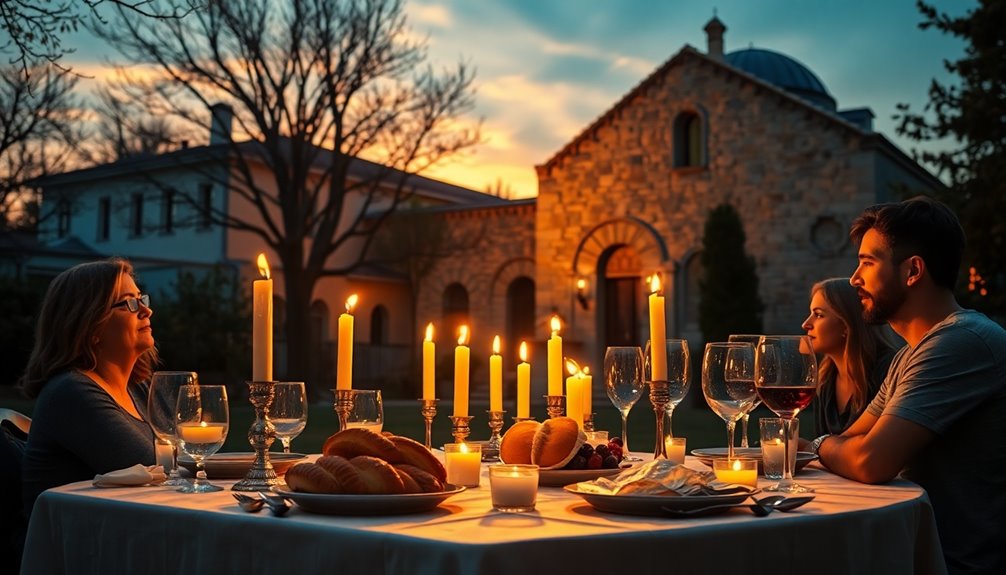
Central to Jewish life, the Sabbath—known as Shabbat—holds profound significance as both a day of rest and spiritual renewal. Mandated by the Ten Commandments, it's a holy day of rest that runs from Friday evening to Saturday evening. This sacred time is a reminder of God's creation and the covenant between God and Israel, emphasizing the importance of pausing from daily routines.
When you observe the seventh-day Sabbath, you begin with candle lighting 20 minutes before sunset on Friday, creating a warm and inviting atmosphere. Synagogue services follow, allowing for communal worship and prayer. Festive family meals enhance this sense of togetherness, reinforcing the bond within the Jewish community.
The Sabbath isn't just about abstaining from work; it encourages spiritual and intellectual engagement. You can spend time studying religious texts, reflecting on life, and connecting with loved ones. This practice not only enriches your spiritual life but also highlights the significance of rest in a fast-paced world.
The influence of the Sabbath even extends beyond Judaism, shaping the concept of Sunday as a day of rest in Christianity.
Sabbath Observance Frequency
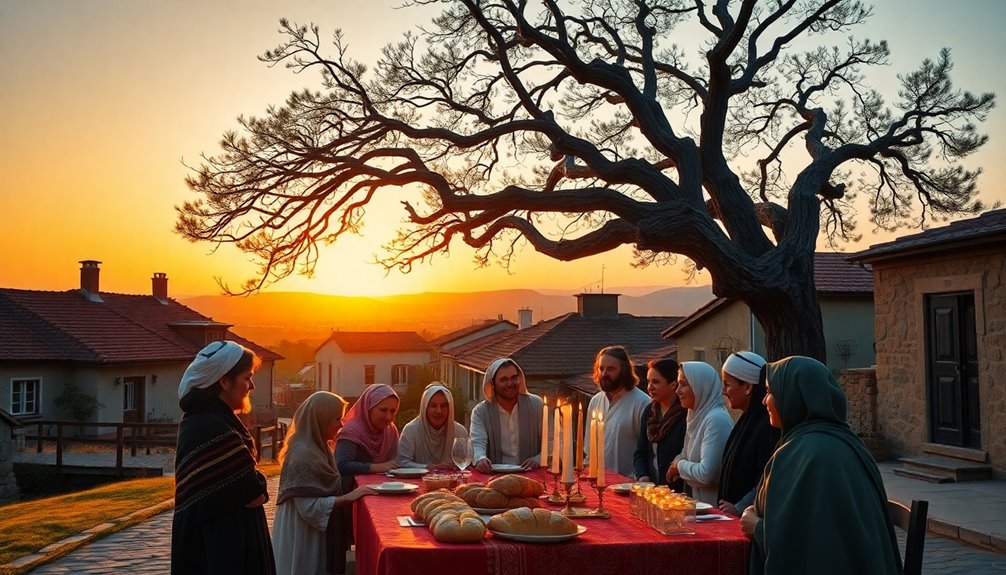
When it comes to Sabbath observance frequency, you might encounter a range of beliefs and practices.
Some people strictly adhere to a weekly Sabbath on Saturday or Sunday, while others believe any day can serve as a time for rest and worship.
Let's explore these perspectives and clarify some common misconceptions about the Sabbath in today's modern workweek.
Debunk Common Sabbath Misconceptions
Many people mistakenly believe that observance of the Sabbath is a rigid requirement that must occur on a specific day each week. In reality, the Sabbath is universally recognized as Saturday, the seventh day of the week.
Historical evidence shows that Jesus and the early church worshiped on Saturday, with no biblical proof of a shift to Sunday during their lifetimes. After the deaths of the apostles, this change began, largely influenced by early church leaders and the Council of Laodicea, which even prohibited Sabbath observance.
Emperor Constantine played a significant role in this transition when he established Sunday as a day of rest in A.D. 321. His motivations stemmed from his connections to sun worship and a desire to distinguish Christian practices from Jewish customs.
Today, many Christian denominations don't insist on adhering to a specific Sabbath day as mandatory. Instead, they allow for individual conviction regarding how often one should observe the Sabbath.
This flexibility means you can choose your own frequency of worship, rather than feeling bound to a particular day.
Sabbath Versus Modern Workweek
Navigating the modern workweek can pose challenges for those seeking to observe the Sabbath. Traditionally, the Jewish Sabbath runs from Friday evening to Saturday evening, while many Christians shift their focus to worship on Sunday, viewing it as the "Lord's Day." This transition, influenced by historical factors, has led to a diverse understanding of the Sabbath across denominations.
For you, balancing work commitments with the desire to keep the Sabbath can be tricky. The demands of a modern workweek often conflict with the need for a dedicated rest day. Some Christian groups, like Seventh-day Adventists, still observe the Sabbath on Saturday, aligning their practices with biblical mandates.
If you wish to embrace Sabbath rest, consider setting aside time on either Saturday or Sunday for worship and reflection. This could mean adjusting your schedule to ensure you honor this vital aspect of your faith.
Finding time for rest and worship is essential, regardless of when you choose to observe the Sabbath. By prioritizing your spiritual needs, you can create a balance that enriches both your work life and your faith journey.
Family Sabbath Traditions
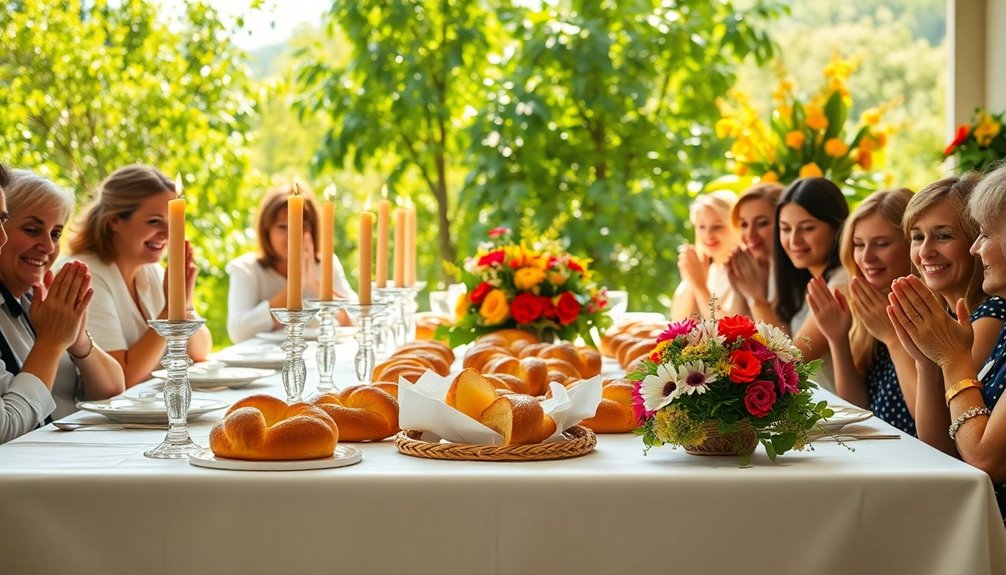
Family Sabbath traditions often begin with everyone pitching in to prepare the meal, creating a sense of unity and anticipation for the evening.
As you gather together for group worship activities, you strengthen both your bonds and your faith.
These shared experiences not only enrich your Sabbath but also create lasting memories for your family.
Family Meal Preparation Together
Preparing for the Sabbath can be a delightful experience that brings everyone together in the kitchen. As the Sabbath begins Friday afternoon, you gather your family for meal preparation, cooking traditional dishes like challah, kugel, and brisket. This time not only fills the home with delicious aromas but also fosters connection and joy among family members.
The first festive meal of the Sabbath, the Shabbat dinner, is a special occasion marked by the recitation of the Qiddush blessing over wine and the ceremonial washing of hands. While preparing the meal, you can engage in meaningful conversations, sharing stories and reflecting on the week gone by. This nurturing environment encourages both spiritual and personal growth, making the preparation process an integral part of your Sabbath observance.
Setting the table with care, lighting candles, and using fine dishes enhances the celebratory atmosphere of the meal. You might even include rituals like singing traditional songs or reading from the Torah, enriching the experience.
Group Worship Activities
Gathering together for group worship activities during the Sabbath creates a profound sense of community and connection among family members.
Your Sabbath traditions often kick off with the beautiful lighting of candles on Friday evening, welcoming the day and setting a peaceful atmosphere for worship and relaxation. As you sit down for the Shabbat dinner, the recitation of the Qiddush over wine and the breaking of bread fosters unity and gratitude among your family.
Engaging in Torah study or discussing spiritual themes during the Sabbath deepens your understanding of Jewish teachings and strengthens family bonds. This shared exploration of faith enriches your worship experience and encourages meaningful conversations.
On Saturday mornings, participating in a communal prayer service at the synagogue allows you to join with others in prayer, read from the Torah, and listen to educational sermons, reinforcing your connection to the community.
Finally, the Havdala ceremony marks the end of the Sabbath with the lighting of a braided candle, a blessing over wine, and the enjoyment of fragrant spices. This transition back to the regular week reminds you of the spiritual significance of the Sabbath and the cherished family traditions that accompany it.
Sabbath's Role in Community Bonding

While observing the Sabbath, you'll find that it creates a unique opportunity for families and communities to come together, strengthening interpersonal bonds through shared meals and worship. This dedicated time fosters a sense of community as you participate in traditional rituals like Friday evening candle lighting and festive meals. These practices not only enhance joy but also create an atmosphere of unity, making everyone feel like they belong.
During the Sabbath, communal participation in synagogue services is essential. Engaging in collective prayers and Torah readings reinforces connections among community members. You'll notice how these shared experiences deepen relationships and cultivate mutual support. Engaging in discussions about spirituality and Jewish traditions enriches the culture of learning, further solidifying your community ties.
Moreover, the Sabbath serves as a vital reminder of Jewish identity and continuity. By collectively upholding traditions and values passed down through generations, you contribute to a strong sense of belonging.
Ultimately, the Sabbath isn't just a day of rest; it's a powerful opportunity to strengthen bonds within your community while fostering a profound connection to your Jewish identity.
Additional Resources
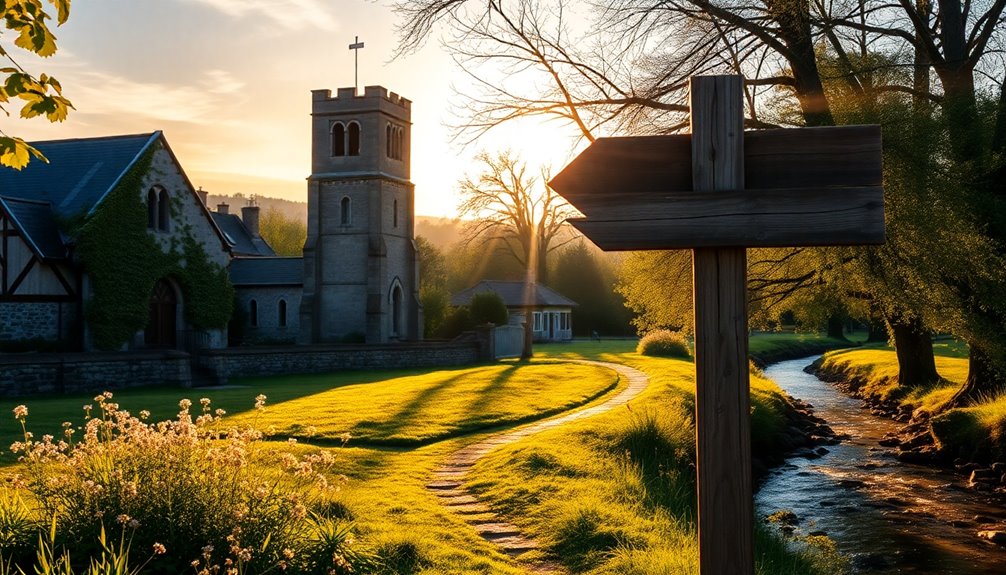
As you explore the significance of the Sabbath in community bonding, you might find it helpful to access additional resources that deepen your understanding.
Delving into the history of the Sabbath reveals that it's traditionally observed on Saturday, the seventh day of the week, as mandated in the Fourth Commandment. You can read about how early Christians primarily maintained Saturday Sabbath observance before shifting to Sunday worship, influenced by historical and cultural factors.
To grasp the transition from the Jewish Sabbath to the Lord's Day, consider resources that discuss Emperor Constantine's role in establishing Sunday as a day of rest in A.D. 321. This change aimed to differentiate Christianity from Judaism, despite many groups, like Seventh-day Adventists and Messianic Jews, continuing to uphold the Biblical Sabbath on Saturday.
Books and articles that focus on the significance of these days will provide a rich context for your understanding.
You might also explore theological discussions that highlight the importance of both Saturday and Sunday worship in fostering community and spiritual growth. Engaging with these resources can help you appreciate the diverse practices surrounding the Sabbath today.
Frequently Asked Questions
Is the Sabbath Day Saturday or Sunday?
You might wonder if the Sabbath day is Saturday or Sunday. Traditionally, many believe Saturday is the Sabbath, as it's the seventh day of the week. This belief is rooted in historical and religious texts.
However, some Christian denominations observe Sunday as their day of rest and worship, influenced by early church decisions.
Ultimately, the day you recognize as the Sabbath can depend on your religious background and personal beliefs.
What Day Is the Sabbath Day According to the Bible?
According to the Bible, the Sabbath day is the seventh day of the week.
You'll find this established in Genesis, where God rested after creation.
Exodus reinforces this by commanding you to remember the Sabbath and keep it holy.
In the New Testament, references confirm that Jesus observed the Sabbath on this same day.
The Hebrew term "Shabbat" means "rest," highlighting its importance as a day of cessation from work.
Why Is Sabbath Changed From Saturday to Sunday?
The Sabbath changed from Saturday to Sunday primarily due to historical and political influences.
You'll see that Emperor Constantine, in A.D. 321, established Sunday as a day of rest, partly to distance Christianity from Jewish traditions.
Later, the Council of Laodicea reinforced this shift, making Sabbath observance illegal.
Over time, these decisions solidified Sunday worship among Christians, reflecting a broader desire for a distinct Christian identity amidst rising anti-Semitic sentiments.
What Day of the Week Did Jesus Keep the Sabbath?
You'll find that Jesus kept the Sabbath on Saturday, the seventh day of the week. He regularly attended the synagogue on this day, as noted in the New Testament.
After his crucifixion, his followers also rested on the Sabbath, aligning with the commandment.
Early Christians initially honored Saturday as the Sabbath, but over time, worship shifted to Sunday.
Understanding this context helps clarify Jesus' practices regarding the Sabbath.










